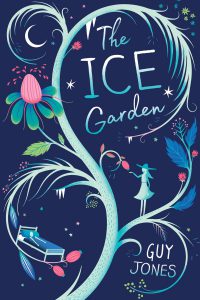 Because of an extreme sensitivity to the sun, twelve-year-old Jess has to dress up in an outfit best suited to tending bees. Feeling frustrated and alienated about a life that makes her different, she slips out at night to experience the outdoors and to explore the neighborhood like other children might.
Because of an extreme sensitivity to the sun, twelve-year-old Jess has to dress up in an outfit best suited to tending bees. Feeling frustrated and alienated about a life that makes her different, she slips out at night to experience the outdoors and to explore the neighborhood like other children might.
One night while searching for a normal life, Jess steps through a gap in a laurel hedge at the city park and discovers a world composed completely and entirely of ice. Glittering white and brilliant silver, the ice garden could be the result of her imagination or her dreams. Here she meets Owen, and they frolic, explore, compete, and play. For the first time, Jess has a friend, she feels free, and she’s happy. She yearns to live in the garden forever.
With the rising of the sun, reality takes a wrecking ball to her fantasies, and she returns to her predictable world of home-school lessons, her stories, her mother, and her trips to Dr. Stannard who pokes and prods and makes her feel more like a lab rat than a human child.
As a result of her differences, Jess’s imagination has always been her best friend. With the writing of her detailed stories, she has trained and honed her imagination to be powerful. As a writer, Jess gives her stories “the flavor and scent of her own imagination” (49). She shares this gift with Davey, a boy in a coma and stuck in his hospital bed. Convinced that Davey can hear her and that he desperately needs to be taken away to some strange and magical world, she writes and then reads her stories to him.
Guy Jones weaves these two parallel stories in his book The Ice Garden. This is an important and powerfully told tale about a child who wonders whether a life fraught with loneliness and despair is worth living. Because the ice garden brings to light an alluring alternative to predictability and pain and alienation; because the ice garden is cold, empty, and dark but inviting, I wonder if it isn’t a metaphor for suicide and the glorification that a young mind might conjure and wish for, a place in which to find escape. Jess’ coming to see Davey, sneaking out at night, and discovering the ice garden where she explores with Owen are events that open a door in her mind, a door that “invites in complete madness” (183). Once she finds this place, she isn’t sure she can return to her life of allergies, absent fathers, and restrictions.
With The Ice Garden, Jones writes not only of friendship, hope, and connections but about the sacrifices that we make in the interest of others. Jones reminds us of the important role that a sense of belonging plays in the formation of identity and the potential consequences of a life lived in the shadows.
- Posted by Donna

